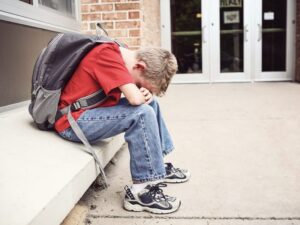
Homeless Children in Our Schools
For many in Baton Rouge, this past month has been one of reflection and remembrance. Remembering things lost, the pain of our friends and families, and the stress of finding normalcy while recovering from the Great Flood of 2016.
As a public school teacher at Woodlawn High School, this time of year holds not only my own memories, but also the sorrow and loss experienced by many of my students during that time. My students not only lost all of their possessions, but they were set adrift–having to live with friends and family or move into hotels or mobile homes while their homes were being repaired. Some had to move parishes away and weren’t sure of where they would end up, in either home or school.
Many would not call this experience being homeless. When people often think of the homeless population in Baton Rouge, they imagine life-worn people holding signs at busy intersections or living in the growing tent cities underneath the interstates. Although these are a very visible form of homelessness, they are only a small fraction of its face. Many others, especially women and children, live in a state of transition; moving from one place to another, yet they are not part of the visible homeless population. This describes the lives of many of my students–some for a year or more.
Last month, thousands of children donned their school uniforms and made their way by bus, car, bike, and on foot to another year in the East Baton Rouge Parish School System. They learned policies and procedures, picked up textbooks and supplies, and ate a meal in their school cafeteria. Most left at the end of the day and headed home to get a snack and get started on their homework. However, four percent of those students are homeless, and they weren’t sure where they were returning home to.
For these families, beginning the school year each year presents many obstacles. If the parents do not have required paperwork for enrollment, how can their children go to school? If the family has to relocate to a new district over the summer, where will the kids be enrolled? And, how can the family purchase uniforms and school supplies when they can’t afford it?
Though the struggle may seem insurmountable, there are resources available for families. “Students who lack a regular, fixed, adequate nighttime residence are classified as homeless,” says Jodi Lemon, Coordinator of the East Baton Rouge Parish School System (EBRPSS) Homeless Program. “We follow the McKinney-Vento Homeless Assistance Act.” This federal act sets out educational rights and responsibilities to children and youth experiencing homelessness. The Louisiana Department of Education (LDOE) utilizes McKinney-Vento to fund subgrants to local education agencies (LEAs) that provide services to students who are experiencing homelessness.
Through the McKinney-Vento Homeless Assistance Act, homeless children can receive the support they need to succeed. State Homeless Coordinator Dr. Antiqua Hunter explains her role in helping reduce barriers to education for students experiencing homelessness, “It is my role to train all LEAs (regular and charter public schools) on the provisions of the Act, which ensure that all students are enrolled immediately in schools, that students stay in school, and that students have the opportunity for success in schools. Each LEA has a Homeless Liaison in their school district who acts as an advocate for families who need help.”
Homeless situations include: sharing the housing of other persons; living in motels, hotels, trailer parks, or camping grounds as temporary housing; living in emergency or transitional shelters or are abandoned in hospitals; staying in a public or private place not designed for or used as a regular sleeping accommodation; or living in cars, parks, public spaces, abandoned buildings, substandard housing, bus or train stations, or similar settings. Lemon explains, “A family may be evicted so they’re living with another family member for a short period of time. That’s not a fixed situation because that family could tell them they have to go at any moment. We have a lot of families and students who live in shelters. Some of our population reside in hotels or motels. Our older kids are called unaccompanied youth. Maybe they’ve been kicked out, have run away or are fleeing certain situations. They may be sleeping on a friends’ sofa.” These situations are unstable, yet should never prevent children from being in school.
“McKinney-Vento students must be given equal access to the same free, appropriate public education, including a public preschool education, as is provided to other children and youth,” shares Dr. Hunter.
Facing a New School Year
The start of a new school year brings a long list of things to do to assure children have the best beginning. Homeless families face added stressors. Lemon says, “Parents want their children to have school stability. They’re worried they won’t be able to have that. Our office helps them with enrollment, uniforms, and school supplies.” The EBRPSS Homeless Program works to keep homeless students in their school of origin, the school they were attending prior to being homeless. When students know they are going back to “their” school, they have something to look forward to even if their homelife is in flux. “When they come through us, we provide transportation for those students so they can go to the same school. Friends are everything for children. Even if the home situation is not stable, at least school is stable, where they have the same teachers and principal. It means so much for children to be known,” Lemon says.
Dr. Hunter agrees, “According to the National Center for Homeless Education, because of the challenging living situations of students experiencing homelessness, school is usually one of the only possibilities for them to experience stability, interact with caring adults or mentors, continue positive peer relationships, gain academic support, and have access to regular meals. Enrolling children and youth experiencing homelessness in school, and ensuring their ability to take part fully in school, caters to the need for security when their lives are uncertain and inconsistent.”
Effects of Homelessness on Students
Because students in transition may be worried where they will be sleeping that night or if they will be kicked out again, they can be distracted at school and also neglect homework. “We try to work with the teachers on being understanding in those situations,” Lemon shares. “If the housing situation isn’t adequate, and the student doesn’t have running water or lights, homework may not be a major concern. A lot of times, it does affect their school work. If we see their attendance is a little off, we contact the parents and the school. If we see their grades are dropping, we ask the parent if it’s okay if we talk to the teacher so they can know what’s going on.”
The Homeless Program also trains administrators and faculty to look for signs of homelessness among their students. Lemon says the program depends on school faculty to tell them about the kids who need help. “If you have a child coming to your class and you notice they are extra hungry or looking extra sleepy, we want to know. A referral can come from anybody.”
Such housing insecurity wears on children, especially when they must switch schools often. In fact, an expert panel report from Loyola University found that students who switch schools suffer psychologically, socially, academically, are more likely to repeat grades, and will have lower math/reading scores.
“Parents think if they don’t have a proof of residence or social security card or birth certificate, and they’re told that they can’t enroll in school, then that’s the end. I want people to know that even without those documents, we can help, you can still enroll in school. They still have the right to be in school until you get all of those things,” says Lemon. For homeless parents who need assistance enrolling children in schools, they can call the Homeless Program.
Once a student is identified as homeless, the Homeless Program will check on them throughout the year, even if the family finds permanent housing. The program staff goes to the schools, checks in with the students, and talks to them one on one to make sure that everything’s going okay. They provide that extra emotional support.
Barriers in Baton Rouge
Though homelessness is a problem in most places, in Baton Rouge, there aren’t many resources for the homeless. According to Dr. Hunter, “The lack of affordable housing, lack of transportation, lack of jobs with sufficient wages, and the large amount of poverty in Baton Rouge are major concerns for families experiencing homelessness.” Shelters in Baton Rouge are lacking for families. Lemon explains, “Especially if you have a family and they have teenage boys, they can’t go to shelters because they will not accept boys over a certain age. We need more family resources.”
Ways to Support These Children
Children are never at fault for their living situation. Homelessness can happen very quickly. “You can easily go from two incomes to one income. Life happens. Adjustments have to be made at any moment. We are all a few paychecks away from being in a situation where you have to make hard decisions,” says Lemon.
Residents of Baton Rouge can contribute to helping these kids. Dr. Hunter recommends volunteering at shelters or tutoring programs, participating in mentorship programs, supporting food banks, and donating uniforms, hygiene products, and school supplies. You can also make monetary donations to the school system to give opportunities for students to take part in extracurricular activities. Lemon adds that the Capital Area Alliance for the Homeless is also a good place to donate because the donations “all circle back to our kids.”
Lemon reminds us to be “more sensitive and compassionate to the needs of others.” We never really know what other people are going through, and offering help can mean the world.
McKinney-Vento programs impact students experiencing homelessness by giving guidance and regulations to ensure that they receive a quality education that can lead to a better life. ■





